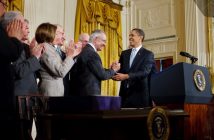Although the President discussed immigration reform only in passing, it was an issue behind other issues he discussed. For example:
Raising the minimum wage. What does a minimum wage of $10.10 have to do with immigration? First, there would be a natural pressure on employers to offer that wage or higher wages if there were not so many people prepared to take jobs for lower wages. An important factor in why wages are currently depressed is because of the enormous illegal alien population and legal admission policies that admit a large number of unskilled and poorly educated persons (as well as the loss of jobs exported under Free Trade Agreements (FTAs). Furthermore, a higher artificial minimum wage would likely induce more employers to avoid the higher labor cost by employing more workers “off the books” (i.e., for cash wages) or as subcontractors to avoid the new minimum wage. Those “off the books” workers would be predominantly illegal alien workers. Besides, increasing labor costs lead to higher prices so that the purchasing power of the higher wage is eroded, and then the poverty level is also raised, i.e., a treadmill.
Approving the TPP (Trans-Pacific Partnership). What does that have to do with immigration? The TPP is another vast FTA like NAFTA with mostly Asian countries. As with other FTAs, they have led to an enormous exodus of manufacturing jobs because of lower wages and working standards in the foreign countries included in the agreements. One of the TPP countries that would become a destination for even more U.S. jobs is Vietnam (population about 90 million). So the TPP would be the other half of the pincer movement squeezing U.S. workers: exporting more U.S. jobs while importing more foreign workers to compete for those remaining jobs. Former Secretary of Labor (under Clinton) Robert Reich seems to agree with this analysis in the WashPost. He says, “The TPP is NAFTA on steroids.”
Combatting income inequality. One of the components of rising income inequality in the U.S. is the rising number of low wage foreign workers (both legal and illegal). So Obama’s backing of the Senate immigration legislation (S.744) which would enormously increase both legal immigration and guestworkers (and probably illegal immigration) would be working directly in opposition to reversing the growing income disparity. The same is true for the TPP. The ostensible initiative against income inequality (a higher minimum wage) would be vitiated by the immigration and free trade policies the administration is pushing.





3 Comments
Raising the Minimum Wage Will Do This
1. Further reduce part time hours to pay for it.
2. Eliminate the jobs totally anyway.
Mr. Martin you wrote the truth there
Well, Reich is absolutely correct that TPP is “NAFTA on steroids”. But if you click the article, you see he actually supported NAFTA and fast track authority [which gives Congress no say but an up or down vote] . Now, he gives the lame excuse that he “fought for” more worker protections during the NAFTA negotiations. Too bad we never got them.
Now he says he doesn’t want fast track authority for this administration for the TPP. Except the article points out that he called fast track authority “vitally important” for a Bush trade initiative in 2007. His even lamer excuse is that he doesn’t remember what he said in 2007.
Just remember this is one of the same liars who has been promoting the myth about how we need more foreign workers in the midst of mass unemployment in this country.